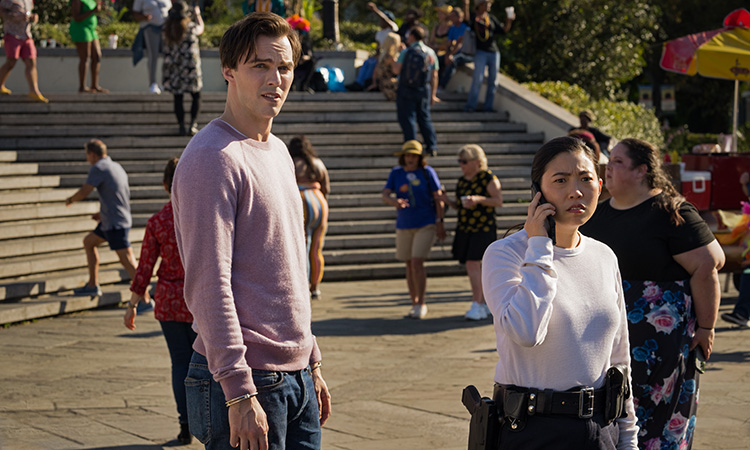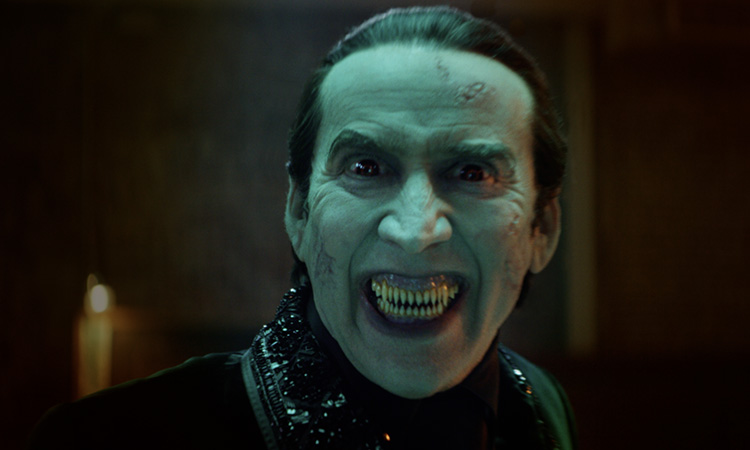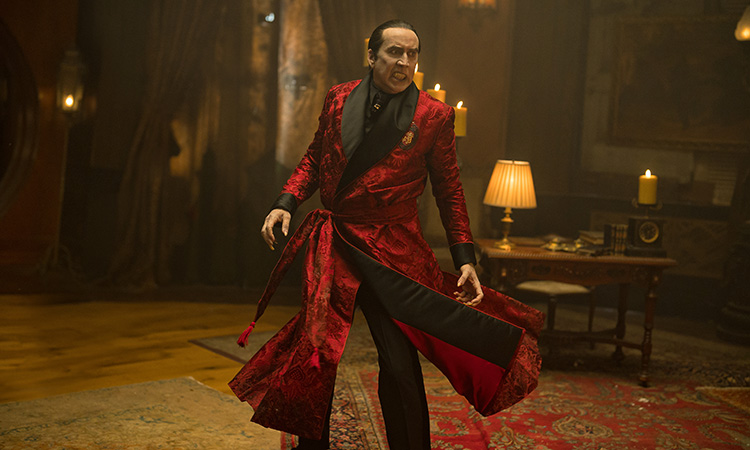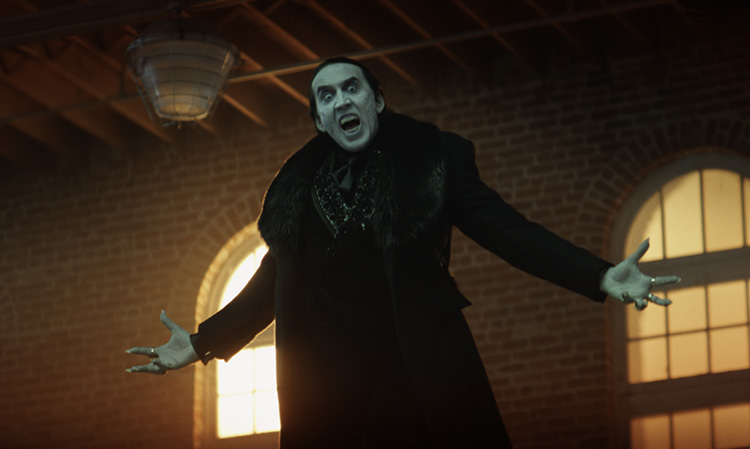“I think Dracula is a character that really lends itself to the human experience,” Nicolas Cage says when we ask him why we’re so obsessed with the character – he was created 125 years ago by Bram Stoker and we’re still making movies about him, including the one we’re talking about today: Renfield.
“Even though he’s supernatural, he’s a character that has this blood lust addiction, you supplant one addiction – like alcohol or heroin or sex – with blood, and then we can relate to that,” Cage continues. “Then you also have this idea of eternal existence as an undead, meaning that he’s always going to get his heart broken or be betrayed again and again. I think that’s the curse of Dracula, which is also a human experience.”
Cage plays the Prince Of Darkness in the new horror comedy Renfield, which follows another character in Stoker’s classic novel: Dracula’s forever obedient servant, Renfield (played by Nicholas Hoult).
Set in the modern day, the classic tale has been switched on its head to tell the story from Renfield’s point of view as he starts to realise his long relationship with Dracula is, in fact, toxic. And after getting tangled up in a local gang war and meeting up with cop Rebecca (Awkwafina), he starts to realise his relationship with the Count might not have to be eternal after all…

The movie was created from an original idea by The Walking Dead’s Robert Kirkman, who basically just wanted a new way to write a Dracula story: “Dracula had been done 1000 different ways and most of those were quite excellent,” he says. “So it was trying to find a different lane where you could set your project apart, and I hit upon the Renfield character, which had a lot of untapped potential.”
Kirkman has teamed up with director Chris McKay (The Lego Batman Movie) and writer Ryan Ridley (Rick And Morty) to bring his idea to life – and with all of those excellent credentials on board, they set about telling a brand new story about these 100-year-old characters.
“Robert and Ryan have come up with such a modern and original take on this world by choosing to focus on the world of Dracula through the lens of his assistant, of the co-dependent relationship that this assistant has with Dracula,” says McKay
“That made it really easy for me to come in and get excited and figure out this movie. You had a character who archetypally could stand in for this big idea of narcissism, the boss from hell. That was something that, thematically, was an incredible foundation for the conflict, for the comedy and an incredible thematic relationship to this character.”

Indeed, Renfield is a horror comedy; those two delicious genres that can go so well together if paired right and it’s a sub-genre that Mr Cage is also a big fan of. “My favourite genre really is this blend of horror and comedy,” he nods. “I think the two, oddly enough, go beautifully together and really put you on a ride in the theatre because you don’t know what’s going to happen.
“It knocks you around, you’re laughing and then all of a sudden you’re screaming and that’s a great feeling when you’re an audience member.”
For Cage, harnessing a lot of that comedy came with working with Hoult, who he had previously worked with on the 2005 comedy drama The Weather Man. “I saw it as a great opportunity to get back on set with Nick and riff off of each other. I was really excited to be able to work with him on a movie with such a specific tone of comedy and horror because I got to see what he could do with that as well and I thought it really helped what I was trying to go for.”
“We had a lovely experience on The Weather Man,” Hoult agrees. “I was 14 years old then so I hadn’t seen a lot of Nic’s brilliant work at that point in my life. I knew who he was and was a fan but then coming back to work with him again as an adult and then get to spend time working with him, particularly on these two characters that have such a history between each other…
“I felt like I’ve just learned so much from him, both in terms of how he approaches the acting work and the scene work, but also just his presence and the kindness he brings to set and the people around.”
Speaking of Cage’s presence, he is an inspired casting choice for Dracula, and though he’s played a vampire before (in 1988’s Vampire’s Kiss) he’s never played the King Of Vampires.
For McKay, he knew that Cage would be perfect for the role, but he wasn’t sure if the studio would agree… “For me, Nicolas Cage was the four leaf clover,” he says. “He’s just one of those people who can do everything. My dream would be to put Nicolas Cage in this movie. I was never sure that the studio was behind that and I think we were all really surprised that the minute that we mentioned Cage, they got really excited.
“That was one of the times I was expecting the worst and I was really pleasantly surprised that the studios were literally as excited about it as I was!”

Once Cage was on board to play the role, the actor’s now-iconic way of putting his own spin on a character was well underway. “He’s so inventive and is always coming up with really surprising choices, really unique choices,” McKay nods. “Cage is this guy who can do so many things. He’s got so many tools. He’s a movie star, he’s a part of film history. Cage is as iconic as Count Dracula, so he fits that.”
We’re sure we can safely say that when you read those words ‘Count Dracula’, a certain story or movie or performer comes into your mind – the character is so wide-varying, appearing in as many mediums as there are, that his name alone will invoke some kind of memory. For Cage, he was first introduced to the character when he was very young, when his father, August Coppola, would project black-and-white 35mm films on a screen in the family’s living room. Among them was 1929’s Nosferatu, starring Max Schreck as the sinister vampire Count Orlok (“I saw it at five, as a child and it was very scary”).
These days, Cage cites a slightly more recent performance of the character as his favourite: “I love Christopher Lee as Dracula,” he says. “I liked the Sixties hairdo. I like the clothes. I liked the Hammer Horror films. He was my Dracula.”
Hoult cites Tod Browning’s 1931 movie, Dracula, with Bela Lugosi playing Dracula as his particular favourite. “Dwight Frye [from that movie] is probably my favourite Renfield as well,” Hoult says. “That was something that I went back and watched a lot. I would listen, I’d have his laugh playing in my headphones on set to carry that with me and kind of pepper in occasionally throughout this story.”
For Kirkman and McKay, bringing this epochal character to the big screen in a different way was a challenge, but one they met with the fervour in-keeping with an archetypal villain: “The iconography of Dracula, the imagery of Dracula, the fangs, the blood, the castles, the bats… everything about it is something that speaks to us and it’s become a huge part of our civilization,” Kirkman says. “Earlier today someone asked the first time I encountered Dracula, and I literally cannot remember, it’s always just been a part of my life. I think that’s probably the case for most people.”

To achieve this, they wanted to put a range of emotions, themes and genres into the movie, balancing the violence, horror and comedy with a genuine emotional core – that of the co-dependant relationship with Dracula and Renfield. “I think people respond to a full buffet when they go see a movie,” McKay says. “Your audience wants to be surprised when they go see a movie. [They are] okay with a tone that can be a little bit flexible, because as long as they feel like the director is, for the most part, in control of it, they will respond to that and love getting excited by that.
“That’s something I think that we all try to adhere to.”
Renfield is out in cinemas now
